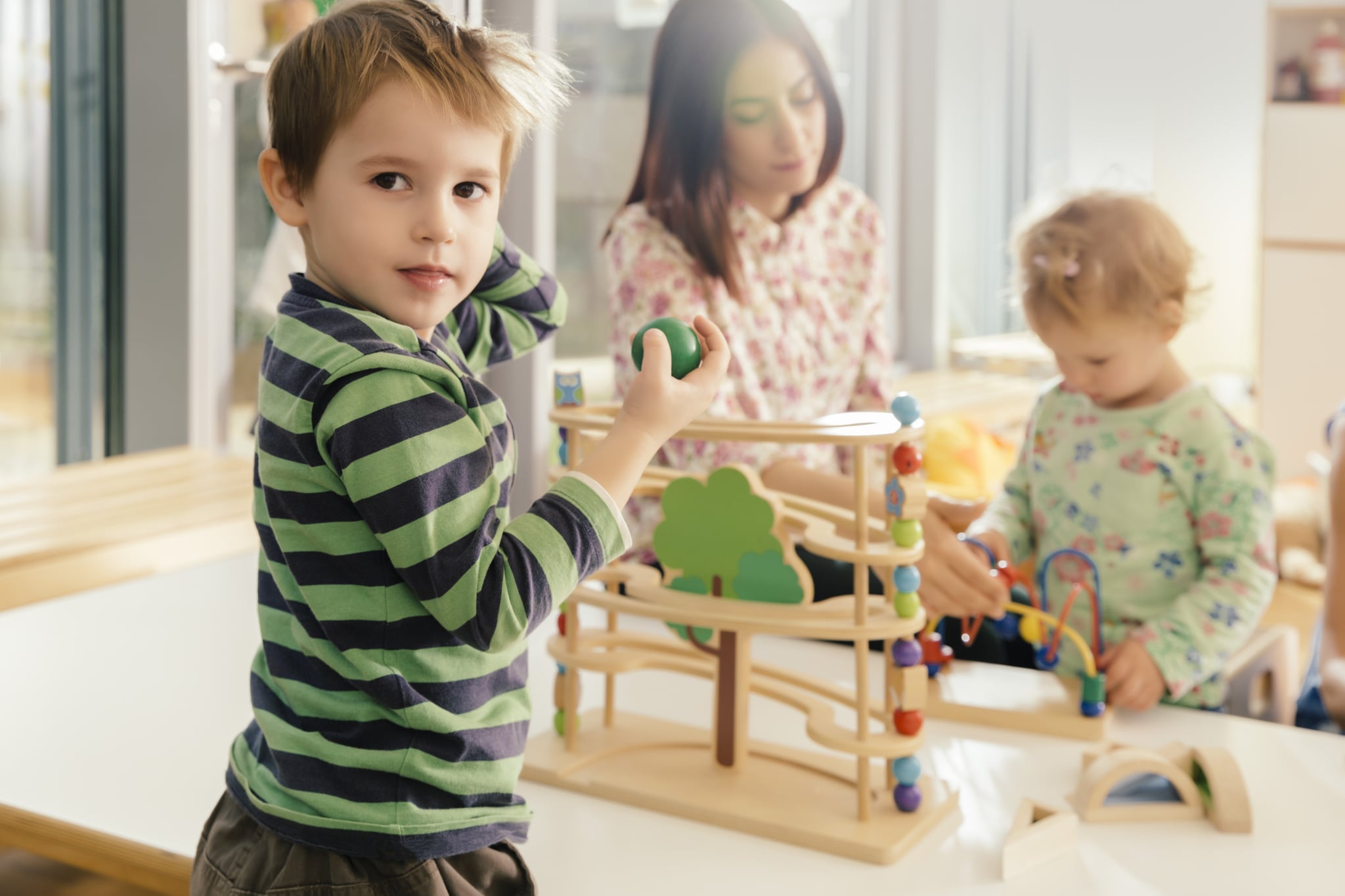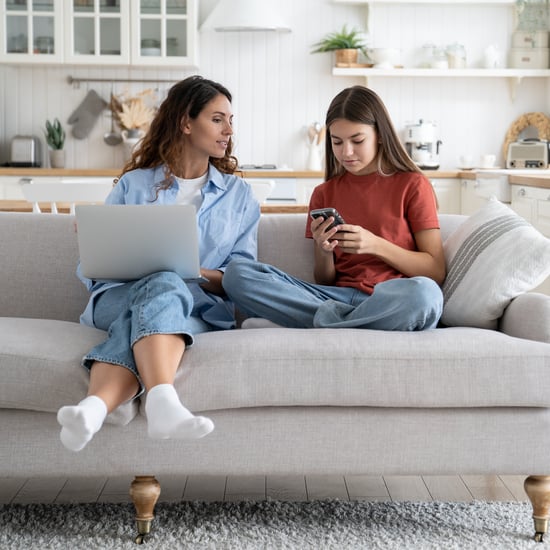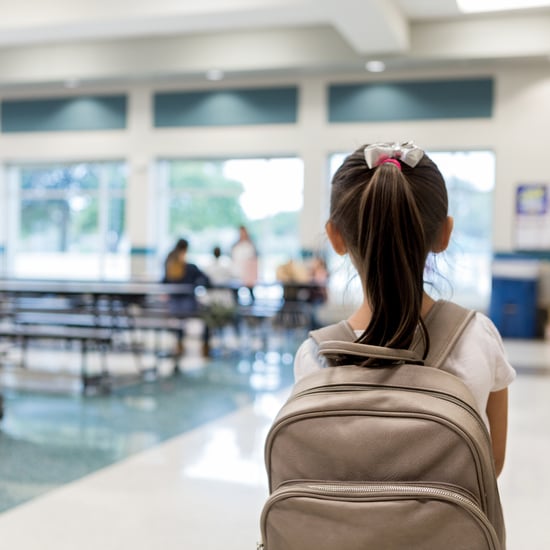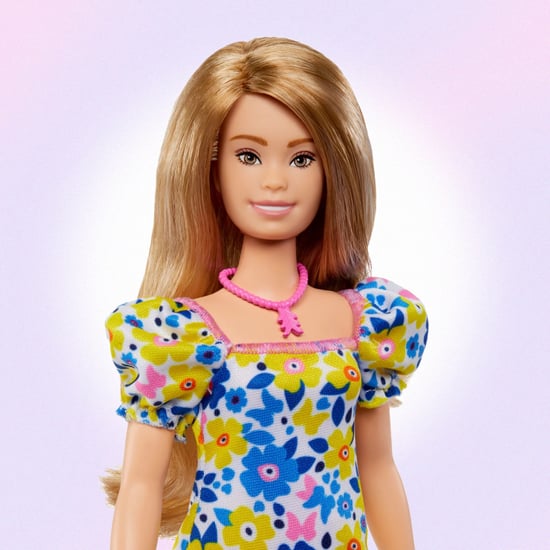What Day-Care Centres Will Look Like Amid Coronavirus
This Is What Day Cares Will Look Like When They Reopen

Although most parents around the nation are still without childcare, plans to reopen day-care facilities are underway. Many, in fact, have remained open in order to serve the children of essential workers. Other businesses that haven't been shuttered by a lack of revenue following more than eight weeks of lockdown orders, are scrambling to set up the safeguards necessary to effectively care for babies and young children amid the coronavirus.
And once these centres are able to open their doors to families, they stand to look a lot different. Here's what parents need to know before returning their children to day care.
When Is the Right Time to Return to Day Care?
Just because you can return your child to day care, doesn't mean you should. Of course, there may be few options for many families due to job demands, but because cases of COVID-19 are still prevalent, there are no guarantees that working parents, children, or child-care staff won't contract and spread it.
"We simply don't have enough information," Kristene Geering, the director of content at Parent Lab, told POPSUGAR of how our nation's return to child care might look, and if it'll be short-lived.
There's a chance families return, the virus spreads, and the government implores businesses to shutter once again. So for those parents who do have the option to continue working from home with their kids, she recommends they consider the risks involved in returning their children to day care right away.
"There may be ways to make day cares safer, but there's simply no way to make them safe."
"My first recommendation would be to consult with their doctors," Geering said. "Look at members of the household and their risk factor for having a severe reaction to the virus. If anyone has an underlying condition that would lead to complications, like asthma or diabetes, if it's at all possible, it might be best to wait until a vaccine is made widely available. Parents should also consider anyone outside their initial sphere of contact. If parents are going back into the office, do they have any coworkers who are at higher risk? If so, can they take measures to ensure they limit the spread of the virus?"
What Measures Are Day Cares Taking to Keep Children Safe?
According to the Centres for Disease Control and Prevention, day-care programs will be able to serve all children with enhanced social distancing measures once their state or local government reaches the necessary phase of its reopening plan.
How child-care facilities plan to foster socially distant care is complicated. Some have begun reaching out to families to set up part-time care. For instance, to reduce the number of children in the facility at one time, the provider might ask some parents send their children for a morning half-day while asking others to do so in the afternoon. Or, they may ask some families to attend on odd versus even days.
The CDC issued a one-page document that providing limited guidance for this type of care. Among the recommended measures were:
- Frequent hand washing
- Cloth masks for staff
- Regular disinfection of all surfaces
- Limiting sharing of materials, such as art supplies, toys, or equipment and disinfecting them in between use
- Avoiding soft toys that cannot be easily disinfected
- Maintaining six-foot distance, if possible
- Head-to-toe positioning with bedding
- Providing as much outdoor time and air as possible, including open windows and fans
- Not using common areas like dining halls or playgrounds, if possible, and if it's necessary, staggering visits and disinfecting in between them
- Restricting the mixing of groups
- Restricting visitors
- Staggering drop-offs and pickups to reduce contact among parents
- Monitoring absenteeism
- Keeping attendance local in order to limit children bringing COVID-19 from high to low transmission areas
- Maintaining a pool of trained substitutes
Still, Geering said, no matter how long the list of precautions runs, it can never be fail-proof.
"There may be ways to make day cares safer, but there's simply no way to make them safe," she said. "You might reduce the number of children in the classroom, but they'll be in close contact with one another if they're at all mobile. Caregivers can wear masks, but odds are good they'll be pulled off multiple times a day – the same reason most child-care workers don't wear dangling earrings."
She had also heard that some day cares may ask children to wear masks but "given the challenges in getting a lot of kids to wear a sunhat part time, wearing a mask full-time doesn't seem feasible."
Will Day Cares Even Be Able to Make This Work?
The idea of maintaining social distance at day care would be laughable before, and, to Geering, it still seems ill-fated now.
"We cannot, in a few weeks, months, or even years, change behaviours that literally thousands and thousands of years of evolution and development have put into place."
"Simply put, social distancing is not developmentally appropriate for children," she said. "It literally goes against their biological programming of seeking out first adults and then peers for comfort. And as their prefrontal cortex doesn't complete its development until their mid-20s, even if schools and day cares put rules into place, kids aren't going to be able to follow them. For example, you wouldn't ask a 4-year-old to drive a car. Even if they could reach the pedals, they're not going to make good choices."
She continued: "Infants and toddlers are not capable of keeping a distance from their adult caregivers or their peers, nor are preschoolers and early elementary kids."
Even if they could understand the reasoning behind these new rules, she warned, they lack the impulse control to follow them consistently.
"We cannot, in a few weeks, months, or even years, change behaviours that literally thousands and thousands of years of evolution and development have put into place," she said. "There are no good answers right now."








